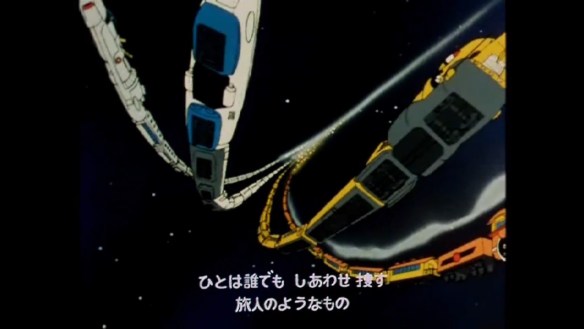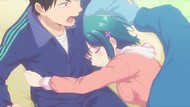Hello folks, and welcome back to Wrong Every Time. Today I’m delighted to announce we are returning to the endless cosmos, as we rejoin our companions aboard the Galaxy Express 999. Across a fantastical sprawl of distinctive planets, we will see love and toil in all their forms, the endless striving of all living beings to survive, prosper, and scratch their mark on the world. And like a terrible wave falling upon them, we will witness the indifference of fate and amorality of capitalism scatter their labors into dreams and driftwood, the cruelty of the world we have constructed forever limiting the scope of our ambitions.
Most recently, that terrible wave has come in the form of a celestial cloud of fossilizing gas, which turned the guardian of our latest planet’s beloved home into a statue garden of lost friends. With that guardian captured by pirates and a fresh cloud of lethal gas en route, Tetsuro and Maetel face a harsh clock as they attempt to retrieve Tetsuro’s boarding pass. Oblivion draws near as we return to Galaxy Express 999!
Episode 13
Given the rules of the Galaxy Express and the show’s general philosophy, I can already imagine how this saga will end – the warrior will relinquish Tetsuro’s ticket willingly, choosing to be together with his love as a fellow statue for all eternity. A fate not so different from the suicidal lovers of the formless planet, who chose to embrace nonexistence at the moment of their peak physical triumph
This is of a piece with Galaxy Express’ general perception of an eternal life, which either involves reducing yourself to a form that cannot appreciate or engage with the world (like these statues), or else assuming a metal body that itself seems to sap all vitality from your experience
Of course, even if he becomes a statue with his love, what then? It was only his active vigilance that kept these statues from being harvested and sold at auction – the moment you are no longer physically capable of defending your body, it will be harvested by capitalism for its own purposes, with no thought to the human soul that once occupied the stone. Granted, even that is not particularly different from how human beings are ground into labor by our current system
God, I love the aesthetic of this planet, all these stone faces staring blankly out from their hills like impromptu burial cairns. The implication of human form only makes the loneliness of this place all the more severe; a place that has been vacated has a different feeling than a place that is simply empty, as the haunting paintings of Giorgio de Chirico (or even the recent game Blue Prince) well emphasize
A long held shot as the sun slowly rises over these statues, their eyes unblinking, their bodies no longer capable of enjoying such a simple, fundamental joy of the universe
“The fossilizing gas cloud will reach here at noon.” False clocks like this are useful in fiction, because they ratchet up tension for the audience while requiring no tangible escalation or change in circumstances on the part of the writer. If you use them too often the audience will get annoyed with the trick, but sparing employment of deadlines that will never be reached is quite effective
That’s really just one illustration of a more general narrative truism – “threats don’t have to be ultimately faced by the protagonists to feel ominous and consequential to the reader,” so long as you properly seed such threats. For a random recent example, I just watched The Hunt for Red October, which proposes “the entire Russian navy is hunting this sub,” but only actually introduces one single pursuer. If convincingly introduced, such devices can increase the assumed threat facing the protagonists without in any way complicating their resolution of the conflict
Maetel leaves Tetsuro her second flashbang earring
With their train still lacking power, Maetel suggests calling another engine for rescue. Nice composition here of them being portrayed from behind one of these digital displays, putting them directly in the display’s crosshairs
Tetsuro employs the flashbang to free the warrior and scatter the raiders. I find it oddly charming how willing this show is to have Tetsuro just kill some motherfuckers from time to time. From the very first episode, it’s displayed an understanding that people like slavers or those who kill for sport must be fought without hesitation
The warrior steals a laser and scampers off with his petrified girlfriend. A nice playful cut here as Tetsuro dodges his laser, face planting with exaggerated stretchiness and actually digging into the dirt
Tetsuro chases him back to his ship and falls into a trap door, after which we return to Maetel. This fossilization cloud is also doing a neat job of tethering these two plotlines together with a common threat
Tetsuro reveals the threat of the approaching gas cloud to the guardian, forcing our warrior to make a hard choice, rather than simply return Tetsuro’s card to him later
The fossil thieves return, now attacking the warrior’s own ship. Many are brutally dispatched by lightning beams and flamethrowers, lots of great child-friendly screaming
It’s interesting how our warrior remains unnamed, even now – a choice that offers the double advantage of better framing him as an unknowable antagonist, and also emphasizing how his story is one of a million equivalent tragedies across the cosmos
The fossil thief captain takes aim at our warrior’s ship, but he fires back! The bastards are defeated!
Tetsuro chases the warrior out to the sands, presaging an old-fashioned duel. “By all means, it looks like we need to settle things for good.”
Our warrior puts up a brave effort, but swords and guns really aren’t evenly matched. Tetsuro blasts him cleanly, and he collapses in the dunes
Tetsuro realizes his opponent held his blade backwards, thus forcing Tetsuro to shoot him even though he never meant to strike back. He has already made his choice, to live and die here with the woman he loves
“I had no doubt that you’re a good guy. It’s an honor to die at your hands.” This was the only gift Tetsuro could grant him: rather than dying to those awful poachers, knowing only he had failed to protect his love, he will die in an honorable duel with a man he respects, his lover safe and close at hand
In this unforgiving universe, can the greatest freedom we might hope for be the freedom to choose our own death?
It seems so – for in his final request, he asks only to be near his beloved Lidya when he dies
His last thought is for his countrymen, asking that if a cure for their paralysis might be found, Tetsuro would come back to save them. We burn our lives to make such feeble flames for each other; I’m reminded of Trader Junction’s Hanako, who put on a performance of marital bliss with Tetsuro just to give her parents less reason to worry
The fossilizing cloud pierces the atmosphere as Maetel prays for Tetsuro’s return. But our boy will not abandon his kindness; as the cloud looms, he toils to draw Lidya to her love’s side
“Now you’ll never be apart.” The only slice of eternity we can hope for
Run, Tetsuro! Run as fast as those stubby little legs can carry you!
“According to railway policy twenty-seven, we absolutely cannot wait.” Once again, when the conductor’s morality is challenged, he cedes to the corporate moral camouflage of policy and regulation
Interestingly, in spite of Maetel’s clear secondary objectives on this trip, she seems willing to die waiting for Tetsuro
Tetsuro makes it back, and the train races just ahead of the storm. At last, the warrior and his love are united in form, bound in stillness for eternity
“But Maetel, isn’t being alive but apart better than fossilized and together?” Tetsuro once again unwittingly challenges his own core motivation, recognizing again that an imperfect mortality is preferable to a static eternity
And Done
Thus the Galaxy Express continues its journey, leaving behind two lovers who found a way to be together forever, at the cost of everything that would make such a union meaningful. Is there beauty in capturing such a bond for all eternity? Perhaps that is the wrong question; beautiful or not, there is no joy in their continued existence, no surprise or curiosity, no disappointment or reconciliation. The further a life stretches, the less color and vitality each length of its fabric contains – and for those who live forever, the texture of their life seems absent entirely, replaced by the cool certainty of stone or sleek anonymity of metal. If Tetsuro truly wishes to live well, he must do as our fossil warrior did, and seek to die well too.
This article was made possible by reader support. Thank you all for all that you do.




